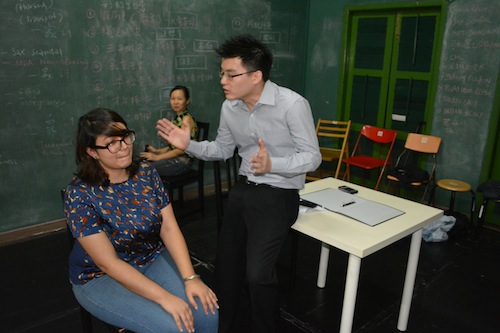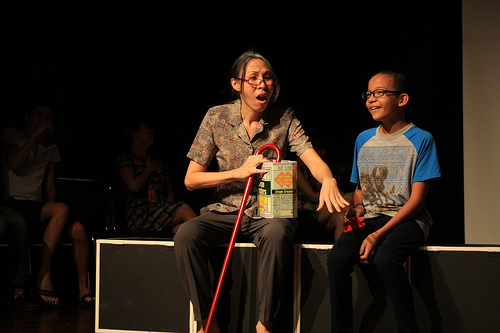[two_third]
Quenyee Wong plays a grandmother in “Just A Bad Day”. Here is what she has to say about her experience as an actor and what it means to be a Change Maker of the We Can! campaign.
For me, it truly was a tall order. Here was an email asking people with full-time jobs and a life – well, we certainly hope so! – and maybe even a dog, to put months of their lives “on hold”, to be in a play. Really? Who does that? Once upon a long time ago, I too wanted to run away with the circus, but I’ve since quite adjusted to the demands of life today, thank you.
What did actually get me to sign up for the We Can! forum theatre workshop was, in fact, what the play was going to be about: violence against women. Something went “bing!” in my head. Women’s rights, human rights, the rights of the downtrodden and misunderstood have always been close to my heart. Over a great part of my life, I did identify with the downtrodden. And here was a chance to do something that took on these issues directly!
So two weeks later saw me walking into a room full of strangers of all ages and races, shapes and genders. You’d only see a more diverse group, well, at the circus. After the initial hellos and introductions, the amazing journey of forum theatre training began! Under the careful moulding of a veteran theatre practitioner named Li Xie, we started to open up and warm towards each other through different trust-building exercises. In one such exercise, we wandered with eyes closed within the confines of a room and, at the instruction of Li Xie, reached out to find a “hand buddy”. That is, we proceeded to feel the hand of the person we had partnered up with, perhaps even smelling it or rubbing it against our faces, so that we could “know it”, all the while with our eyes shut. Then, after mixing us all up again, we had to find our hand buddy purely by feeling dozens of “stranger hands”! What a weird thing to do, I thought, but guess what? Many of us did find our hand buddies, and experienced a most uncanny sense of connection with that person.

Change Makers in rehearsal
The artistic process was most liberating. Soon, this motley crew of volunteers migrated together from a place of shy, giggly awkwardness to a full-on, I-haven’t-even-shared-this-with-my-mom, safe circle of revelatory sharing! The day always ended with everyone coming together in a circle and sharing what we felt or had learnt. And the bare-bones honesty surprised us all! Here was a group of ordinary folk who had come together because we had witnessed or experienced unspeakable violence in our own lives, and now we were bonding over long-hidden secrets. Rape, peer pressure, gender discrimination – you name it, it figured in our individual experiences. It made you think, wow, violence really is just one or two degrees of separation away! In fact, if you were willing to look, you would see it happening in your own life as well.
These stories made their way into a piece of theatre that explored violence in both physical and non-physical forms, set in the everyday scenarios where we had first experienced them. Through a progressive series of exercises involving creating tableaux of actions, we pieced the action together and weaved a coherent whole. In a process called “hot seating”, we had questions posed to us as the character we played (for example, a woman who felt compelled to fulfil the roles of wife, mother and daughter-in-law to the highest degree) and we answered them in character. This helped us better understand the stakes involved and our character’s motivations and “buttons” – words or actions that would make them think twice or even change their behaviour. These were “buttons” that our audience members could “push” in order to trigger a different way of thinking or acting.

Quen in character, interacting with a member of the audience during a performance of “Just a Bad Day”.
All in all, the process of creating a forum theatre devised piece made each of us more aware of why protagonists in any particular situation make the decisions they do, which create or add to a cycle of action. We had all come with a certain set of ideas about the issues in violence, and through role-play and discussion, had discovered a lot of the “grey” in things we used to think of as pretty black-and-white. Taking on these issues didn’t sway our resolve. On the contrary, it imbued us with some wisdom: solutions are not cut and dry, and people have to arrive at their own solutions organically.
At the We Can! forum theatre workshop, we found our “therapy” – sharing our stories and putting them together in a theatre piece had, in effect, released us from their hold and re-purposed them for good. Now, it is time to take our process to the masses, to get them to share as well!
We named the play, “Just A Bad Day”, and recognised ourselves as “Change Makers”. Using everything we have learnt from the workshop, the “Just A Bad Day” Change Makers will take the play to Singapore’s multi-racial, multi-religious, multi-abled, multi-gendered, multi-affiliated communities over an entire year.
People need to feel empowered to say no, to pipe up when they would ordinarily have kept mum, to step in where they might have stepped aside before because they thought that violence was a private matter. But it isn’t. Just as you can step into the world of the forum theatre and do something differently, we want people to know that they can change the course of real life, and hopefully history, simply by acting on it.[/two_third]





